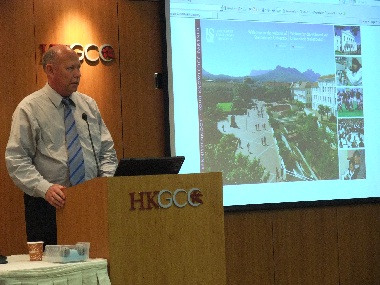Presenter: Johann Kinghorn
Director of the Centre for Knowledge Dynamics and Decision-making at Stellenbosch University, South Africa.
The battle cry of KM has reached Africa in the early years of this decade, and by now it has become a continental movement which is driven forward by governments, more so than business. The result: everyone is now supposed to “do” KM. And the enthusiasm, at least at the level of rhetoric is ubiquitous.
The issue of appropriate knowledge in and for Africa is utterly absorbing but hugely complex. It is not possible to talk about knowledge in Africa without engaging with the problem of global power relations. Knowledge is, after all, power.
 Johann Kinghorn, Kinghorn, Director of the Centre
Johann Kinghorn, Kinghorn, Director of the Centre
by Knowledge Dynamics and Decision-making at
Stellenbosh University, South Africa
In this talk, however, I will zoom in on only one interesting aspect. The purpose will not be to analyse the global power structures, but to indicate how the African discourse on KM might enrich the global understanding of KM.
The one interesting aspect relates to a fundamental disconnect of African KM needs with available KM theory and ‘best practices’. This has to do with the nature of African economies. As most people know, outside South Africa, there is not a strong business infrastructure in Africa (although this is changing) and where there are pockets of modern economies these are mostly related to primary economic activities. Yet the cry for KM does not come from such pockets. There is a belief that KM is about general society’s needs for knowledge and development. In short the underlying theme in African KM is not how organisational knowledge is to be managed, but how societal knowledge is to be generated and managed.
The disconnect then plays itself out as follows: what may be called classic KM (going back to the mid-nineties) was always driven by the needs of private business. Only much later did governments enter the picture and to date there is still no solid public service KM model or theory on offer.
African KM thus faces the task of developing KM for societal purposes, having to draw on theory and praxis from private business. Not surprising there are some who are disillusioned by “western” theory and find it difficult to relate such business theory with African societal needs and culture. It is from such circles that the cry goes out for a rediscovery of indigenous knowledge and a KM praxis built on that foundation.
The implications of this disconnect is not only interesting, but also potentially creative. In this case the old saying in Roman time ‘ex Africa semper aliquid novi’
In the same way that KM was invigorated by a non-Western insight (Nonaka) in the nineties, the African reflection in the next few years on KM may broaden our theoretical understanding of KM further.
(* ‘out of Africa there is always something new’, see here)
About the presenter
Johann Kinghorn is Director of the Centre for Knowledge Dynamics and Decision-making at Stellenbosch University, South Africa.
The Centre runs a major KM Masters Programme which is in operation since 2000. What makes the Programme unique is that it is neither a correspondence nor a localised programme. A rather unique model of delivery has been developed over the past decade, which allows participation of students from a number of African countries and all over Southern Africa. The result is a network of students comprising 10 countries with more than 30 different home languages (although the Programme language is English). The total number of students involved in 2010 is expected to be 200.
The Centre uses Johannesburg as the hub for the programme. Johannesburg is the dominant commuter, financial and economic hub of most of sub-Saharan Africa. But teaching staff also work with students where they reside and work from time to time. As a consequence staff have an intimate understanding of developments on the ground in Africa.
The KM Programme was evaluated by an international panel in 2005 who found it to be one of the leading KM programmes in the world.